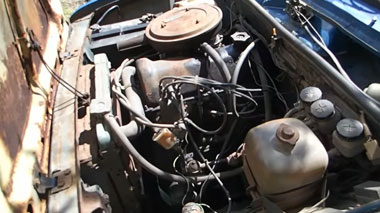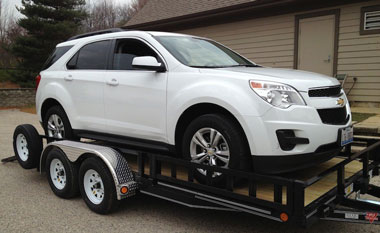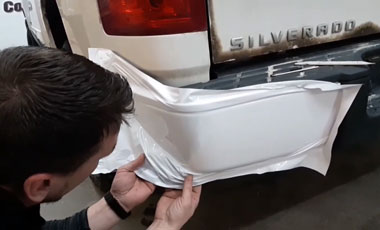A wheel bearing is a set of steel balls held together by a metal ring called a race. They help wheels rotate smoothly and quietly. Most bearings are sealed to keep out dirt and water.
When they fail, it’s often because the seals have failed. However, it’s also possible for bearings to fail without any detectable play in the wheel.
If you’re experiencing strange noises coming from your car, it’s possible that your wheel bearing is to blame. But what if there’s no play in the bearing? Can it still be bad?
Unfortunately, yes. While play in the bearing is a telltale sign that something is wrong, a lack of play doesn’t necessarily mean everything is okay. In fact, a seized or damaged wheel bearing can actually cause damage to your car’s suspension.
If you think your wheel bearing may be going bad, even without any play, it’s best to have it checked out by a professional as soon as possible.
Diagnosing Which Wheel Bearing is Bad
If you’re hearing a grinding noise coming from your car, it’s possible that one of your wheel bearings is going bad. But how do you know which one is the culprit? Here’s a quick guide to help you diagnose which wheel bearing is bad.
First, take a look at all four of your tires. If one of them looks like it’s sitting lower than the others, that could be an indication that the wheel bearing on that tire is starting to fail.
Next, get your car up on a jack and spin each tire by hand.
If you feel any roughness or resistance when spinning a particular tire, there’s a good chance that the wheel bearing on that tire is bad.
Finally, take your car for a test drive and see if you can replicate the noise while driving. If the noise gets louder when driving over bumps or making turns, it’s likely that the problem is with a specific wheel bearing.
Once you’ve determined which wheel bearing is bad, it’s time to replace it with a new one. Be sure to have a qualified mechanic do this job for you to ensure proper installation and avoid further damage to your car.
Symptoms of a Bad Wheel Bearing
If you suspect that your vehicle has a bad wheel bearing, there are a few symptoms that you can look for to confirm your suspicions. One of the most common signs is abnormal tire wear. If you notice that one particular area of your tire is wearing down more quickly than the rest, it’s possible that there is an issue with the wheel bearing.
Another symptom to watch out for is steering issues. If you find that your car is pulling to one side or struggling to turn, this could be another sign that something is wrong with the wheel bearings. You may also hear strange noises coming from your tires or suspension as you’re driving – these sounds will usually be louder when driving at higher speeds.
If you experience any of these issues, it’s important to get your vehicle checked out by a mechanic as soon as possible so they can diagnose and fix the problem before it causes any further damage.
Bad Wheel Hub Symptoms
If you’re experiencing any of the following bad wheel hub symptoms, it’s time to have your vehicle checked out by a mechanic. Continuing to drive on a damaged or failing wheel hub can cause further damage to your vehicle and may even pose a safety hazard.
Vibration: If you feel excessive vibration coming from one particular side of your vehicle while driving, this is likely due to a problem with the wheel hub on that side.
The vibration may be more pronounced at higher speeds.
Noise: A clicking, grinding, or roaring noise when driving could also indicate a problem with the wheel hub. This is often caused by worn-out bearings within the hub assembly.
Loose steering: If it feels like your steering has become loose or unresponsive, this could be another sign that the wheel hub assembly on your vehicle is failing. If you notice any of these bad wheel hub symptoms while driving, don’t delay in getting your car checked out by a qualified mechanic. Driving on a damaged or failing wheel hub can cause further damage to your car and may even pose a safety hazard.
How to Fix Bad Wheel Bearing?
Bad wheel bearings are a common problem with cars. The symptoms of bad wheel bearings include noise from the wheels, vibration in the steering wheel, and increased tire wear. If you suspect that your car has bad wheel bearings, there are a few things that you can do to fix the problem.
The first thing that you need to do is to check the bearing for damage. You can do this by removing the hub cap and inspecting the area around the bearing. If you see any rust or damage, then you will need to replace the bearing.
Next, you need to check the axle for damage. To do this, remove the axle nut and inspect the threads. If they are damaged, then you will need to replace the axle.
Finally, you need to check the suspension for damage. Remove all of the suspension components and inspect them for cracks or other damage. If you find any damage, then you will need to replace those parts as well.
If your car has bad wheel bearings, don’t wait to fix them. The sooner you fix them, the less chance there is of further damage occurring.
Bad Wheel Bearing Sound
If you’re driving and you hear a grinding or roaring sound coming from one of your wheels, it’s likely that your wheel bearing is failing. Wheel bearings are an important part of your suspension system, and they help to keep your wheels spinning smoothly. When they fail, the results can be disastrous.
The first thing you’ll notice when your wheel bearing starts to fail is a loud noise coming from the affected wheel. This noise will get progressively louder the longer the bearing is allowed to deteriorate. eventually, if left unchecked, the wheel can come completely loose from the vehicle while you’re driving!
If you think you might have a failing wheel bearing, it’s important to get it checked out by a qualified mechanic as soon as possible. They’ll be able to diagnose the problem and replace the damaged component before it causes any further damage to your car.
How to Check for Bad Wheel Bearing?
If you suspect that your car may have a bad wheel bearing, there are a few things you can do to check. First, take a look at the condition of your tires. If they are worn down on one side more than the other, it could be an indication that your wheel bearing is going bad.
Next, listen for any strange noises coming from the wheels or suspension while driving. A bad wheel bearing will often make a grinding or growling sound. If you hear anything unusual, be sure to have it checked out by a mechanic as soon as possible.
Finally, pay attention to how your car feels while driving. If it seems to pull to one side or vibrates excessively, again, these could be signs of a problem with the wheel bearing and should be looked at by a professional right away.
Bad Wheel Bearing Cause Uneven Tire Wear
Bad wheel bearings can cause uneven tire wear for a number of reasons. First, if the bearings are not properly seated in the wheel hub, they can allow the wheel to wobble. This will cause the tires to scrub against the road surface, causing them to wear unevenly.
Additionally, if the bearings are worn out or damaged, they can also cause the wheel to wobble, which will again lead to uneven tire wear. Finally, if the Wheel Bearing Retainer Clip is missing or damaged, it can also allow excessive play in the bearing, leading to increased tire wear.
What Causes is a Wheel Bearing to Keep Going Bad?
If you’ve ever had a wheel bearing go bad on you, then you know how frustrating it can be. You might be wondering what causes a wheel bearing to keep going bad. There are actually a few different things that can cause this problem.
One of the most common reasons for a wheel bearing to keep going bad is improper maintenance. If you don’t keep your bearings clean and lubricated, they will eventually start to wear out. Over time, this wear can lead to the bearings becoming loose and causing problems.
Another common reason for wheel bearings to fail is due to poor-quality parts. If you’re using cheap or lower-quality parts, they may not be able to handle the load and stress that’s placed on them. This can lead to premature failure.
Finally, sometimes wheel bearings just fail due to normal wear and tear. No matter how well you maintain them or what kind of parts you use, they will eventually need to be replaced. It’s just a fact of life.
If you’re having trouble with your wheel bearings, it’s important to have them checked out as soon as possible. Ignoring the problem will only make it worse and could eventually lead to an accident.
How Do You Diagnose a Bad Wheel Bearing With No Play?
If your wheel has no play, it doesn’t necessarily mean that the wheel bearing is bad. However, if you hear a grinding noise coming from the wheel area, it’s likely that the bearing is worn out and needs to be replaced.
To diagnose a bad wheel bearing with no play, you’ll need to first check the condition of the axle shaft.
If there’s any damage to the shaft, it will need to be replaced before checking the bearings.
Next, jack up the vehicle and support it on stands. Grab hold of the tire at 12 and 6 o’clock and try to move it back and forth.
If there’s any play in the tire, then it’s likely that the bearing is worn out and needs to be replaced.
Will a Bad Wheel Bearing Have Play?
If a wheel bearing is bad, there will be play in the bearing. This can be felt as a wobble in the wheel or a grinding noise coming from the bearing. If the bearing is only slightly damaged, there may not be any noticeable symptoms until the damage becomes severe.
How Do I Know If My Wheel Bearings are Bad While Driving?
If you’re driving and you notice that your steering feels loose, or that your car is making a grinding noise, there’s a good chance your wheel bearings are going bad. Other signs include vibrating when you brake, or if your car pulls to one side while driving.
To check your wheel bearings, you’ll need to jack up your car and remove the wheels.
With the wheels off, spin each bearing by hand. If it’s smooth, then the bearing is still in good shape. But if you feel any roughness or resistance, then the bearing is starting to fail.
In some cases, you may be able to replace just the outer race of the bearing (assuming it’s not too damaged). But in other cases, you’ll need to replace the entire bearing assembly. This can be a pretty involved repair job, so unless you’re confident in your skills (or know someone who is), it’s probably best left to a professional mechanic.
How Much Play Should a New Wheel Bearing Have?
If you are noticing that your vehicle is starting to make a racket when you drive, it may be time to check your wheel bearings. Wheel bearings help keep the wheels in place and allow them to rotate freely. Over time, they can become worn down and will need to be replaced.
But how do you know if it’s time to replace your wheel bearings? And how much play should they have? First, let’s take a look at what wheel bearings are and what they do.
Wheel bearings are made up of an inner race, an outer race, and a set of rolling elements (usually balls or needles). These components are all held together by a cage. The inner race is attached to the hub of the wheel, while the outer race is pressed into the brake drum or axle housing.
The rolling elements sit in between the two races and help reduce friction as the wheels rotate. Over time, however, the rolling elements can become worn down from use. This can cause them to lose their ability to effectively reduce friction.
As a result, your vehicle will start to make noise as it moves down the road – usually a grinding or humming sound that gets louder as you accelerate. Additionally, your vehicle may start to vibrate or feel “shaky” as you drive. If you notice any of these symptoms, it’s important to have your vehicle inspected by a qualified mechanic as soon as possible so they can determine if your wheel bearings need to be replaced.
So how much play should new wheel bearings have? Ideally, none at all! However, in reality there will always be some slight amount of play present – this is normal and nothing to worry about.
You should only be concerned if there is excessive play in your wheel bearings (i.e., more than 1/16″). Excessive play can indicate that the bearing has become damaged and needs to be replaced before further damage occurs.
In summary, pay attention for any strange noises or vibrations coming from your wheel area while driving – these could be signs that your wheel bearings need replacing soon. New wheel bearings should have very little play (no more than 1/16″), so if there is excessive play present then have your car checked out by a professional right away!
Conclusion
A wheel bearing is a crucial part of a car’s suspension, and if it starts to fail, it can cause some serious problems. One common symptom of a failing wheel bearing is playing in the steering wheel. If you notice that your steering wheel has started to feel loose, or if you hear a grinding noise coming from the front of your car, then it’s possible that your wheel bearings are starting to fail.
In some cases, a bad wheel bearing can cause the entire suspension to collapse, so it’s important to get it fixed as soon as possible.







































